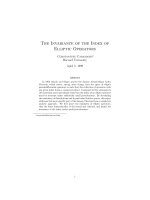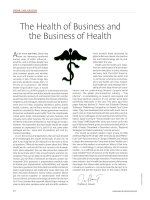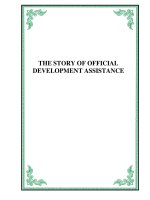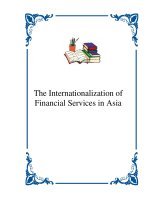Tài liệu The History Of England, Volume I, Part Viby From Charles Ii To James Ii (illustrated Edition) (dodo Press) By David Hume ppt
Bạn đang xem bản rút gọn của tài liệu. Xem và tải ngay bản đầy đủ của tài liệu tại đây (34.5 MB, 422 trang )
The History of England,
Volume I, Part VI: From
Charles II to James II
David Hume
THE HISTORY OF ENGLAND
Volume One of Three
FROM THE INVASION OF JULIUS CÆSAR
TO THE END OF THE REIGN OF JAMES THE SECOND,
BY DAVID HUME, ESQ.
1688
In Three Volumes:
VOLUME ONE: The History Of England From The Invasion Of
Julius Cæsar To The End Of The Reign Of James The Second.
by David Hume, Esq.
VOLUME TWO: Continued from the Reign of William and Mary to
the Death of George II
by Tobias Smollett.
VOLUME THREE: From the Accession of George III. to the Twenty-
Third Year of the Reign of Queen Victoria
by E. Farr and E.H. Nolan.
VOLUME ONE
Part VI.
From Charles II. to James II.
CONTENTS
CHAPTER LXIII.
CHARLES II.
CHAPTER LXIV.
CHARLES II.
CHAPTER LXV.
CHARLES II.
CHAPTER LXVI
CHARLES II.
CHAPTER LXVII.
Charles II.
CHAPTER LXVIII.
CHARLES II.
CHAPTER LXIX.
CHARLES II.
CHAPTER LXX.
JAMES II.
CHAPTER LXXI.
JAMES II.
NOTES.
List of Illustrations
Charles II.
Chatham
Hyde Park
Archbishop Sharpe
James II.
Duke of Monmouth
The History of England, Volume I, Part VI
1
CHAPTER LXIII.
The History of England, Volume I, Part VI
2
CHARLES II.
1660
CHARLES II., when he ascended the throne of his ancestors, was
thirty years of age. He possessed a vigorous constitution, a fine
shape, a manly figure, a graceful air; and though his features were
harsh, yet was his countenance in the main lively and engaging. He
was in that period of life when there remains enough of youth to
render the person amiable, without preventing that authority and
regard which attend the years of experience and maturity.
Tenderness was excited by the memory of his recent adversities. His
present prosperity was the object rather of admiration than of envy.
And as the sudden and surprising revolution which restored him to
his regal rights, had also restored the nation to peace, law, order, and
liberty, no prince ever obtained a crown in more favorable
circumstances, or was more blessed with the cordial affection and
attachment of his subjects.
This popularity the king, by his whole demeanor and behavior, was
well qualified to support and to increase. To a lively wit and quick
comprehension, he united a just understanding and a general
observation both of men and things. The easiest manners, the most
unaffected politeness, the most engaging gayety, accompanied his
conversation and address. Accustomed during his exile, to live
among his courtiers rather like a companion than a monarch, he
retained, even while on the throne, that open affability which was
capable of reconciling the most determined republicans to his royal
dignity. Totally devoid of resentment, as well from the natural lenity
as carelessness of his temper, he insured pardon to the most guilty of
his enemies, and left hopes of favor to his most violent opponents.
From the whole tenor of his actions and discourse, he seemed
desirous of losing the memory of past animosities, and of uniting
every party in an affection for their prince and their native country.
Into his council were admitted the most eminent men of the nation,
without regard to former distinctions: the Presbyterians, equally
with the royalists, shared this honor. Annesley was also created earl
of Anglesey; Ashley Cooper, Lord Ashley; Denzil Hollis, Lord Hollis.
The History of England, Volume I, Part VI
3
The earl of Manchester was appointed lord chamberlain, and Lord
Say, privy seal. Calamy and Baxter, Presbyterian clergymen, were
even made chaplains to the king.
Admiral Montague, created earl of Sandwich, was entitled from his
recent services to great favor; and he obtained it. Monk, created duke
of Albemarle, had performed such signal services, that, according to
a vulgar and malignant observation, he ought rather to have
expected hatred and ingratitude; yet was he ever treated by the king
with great marks of distinction. Charles’s disposition, free from
jealousy, and the prudent behavior of the general, who never
overrated his merits, prevented all those disgusts which naturally
arise in so delicate a situation. The capacity, too, of Albemarle was
not extensive, and his parts were more solid than shining. Though he
had distinguished himself in inferior stations, he was imagined,
upon familiar acquaintance, not to be wholly equal to those great
achievements which fortune, united to prudence, had enabled him to
perform; and he appeared unfit for the court, a scene of life to which
he had never been accustomed. Morrice, his friend, was created
secretary of state, and was supported more by his patron’s credit
than by his own abilities or experience.
But the choice which the king at first made of his principal ministers
and favorites, was the circumstance which chiefly gave contentment
to the nation, and prognosticated future happiness and tranquillity.
Sir Edward Hyde, created earl of Clarendon, was chancellor and
prime minister; the marquis, created duke of Ormond, was steward
of the household, the earl of Southampton, high treasurer; Sir
Edward Nicholas, secretary of state. These men, united together in
friendship, and combining in the same laudable inclinations,
supported each other’s credit, and pursued the interests of the
public.
Agreeable to the present prosperity of public affairs was the
universal joy and festivity diffused throughout the nation. The
melancholy austerity of the fanatics fell into discredit together with
their principles. The royalists, who had ever affected a contrary
disposition, found in their recent success new motives for mirth and
gayety; and it now belonged to them to give repute and fashion to
The History of England, Volume I, Part VI
4
their manners. From past experience it had sufficiently appeared,
that gravity was very distinct from wisdom, formality from virtue,
and hypocrisy from religion. The king himself, who bore a strong
propensity to pleasure, served, by his powerful and engaging
example, to banish those sour and malignant humors which had
hitherto engendered such confusion. And though the just bounds
were undoubtedly passed, when men returned from their former
extreme, yet was the public happy in exchanging vices pernicious to
society, for disorders hurtful chiefly to the individuals themselves
who were guilty of them.
It required some time before the several parts of the state, disfigured
by war and faction, could recover their former arrangement; but the
parliament immediately fell into good correspondence with the king;
and they treated him with the same dutiful regard which had
usually been paid to his predecessors. Being summoned without the
king’s consent, they received, at first, only the title of a convention;
and it was not till he passed an act for that purpose, that they were
called by the appellation of parliament. All judicial proceedings,
transacted in the name of the commonwealth or protector, were
ratified by a new law. And both houses, acknowledging the guilt of
the former rebellion, gratefully received, in their own name, and in
that of all the subjects, his majesty’s gracious pardon and indemnity.
The king, before his restoration, being afraid of reducing any of his
enemies to despair, and at the same time unwilling that such
enormous crimes as had been committed should receive a total
impunity, had expressed himself very cautiously in his declaration of
Breda, and had promised an indemnity to all criminals, but such as
should be excepted by parliament. He now issued a proclamation
declaring that such of the late king’s judges as did not yield
themselves pris-* *-oners within fourteen days, should receive no
pardon. Nine teen surrendered themselves; some were taken in their
flight; others escaped beyond sea.
The commons seem to have been more inclined to lenity than the
lords. The upper house, inflamed by the ill usage which they had
received, were resolved, besides the late king’s judges, to except
every one who had sitten in any high court of justice. Nay, the earl of
The History of England, Volume I, Part VI
5
Bristol moved, that no pardon might be granted to those who had
anywise contributed to the king’s death. So wide an exception, in
which every one who had served the parliament might be
comprehended, gave a general alarm; and men began to apprehend,
that this motion was the effect of some court artifice or intrigue. But
the king soon dissipated these fears. He came to the house of peers,
and in the most earnest terms passed the act of general indemnity.
He urged both the necessity of the thing, and the obligation of his
former promise; a promise, he said which he would ever regard as
sacred; since to it he probably owed the satisfaction which at present
he enjoyed of meeting his people in parliament. This measure of the
king’s was received with great applause and satisfaction.
After repeated solicitations, the act of indemnity passed both houses,
and soon received the royal assent. Those who had an immediate
hand in the late king’s death, were there excepted: even Cromwell,
Ireton, Bradshaw, and others now dead, were attainted, and their
estates forfeited. Vane and Lambert, though none of the regicides,
were also excepted. St. John and seventeen persons more were
deprived of all benefit from this act, if they ever accepted any public
employment. All who had sitten in any illegal high court of justice
were disabled from bearing offices. These were all the severities
which followed such furious civil wars and convulsions.
The next business was the settlement of the king’s revenue. In this
work, the parliament had regard to public freedom, as well as to the
support of the crown. The tenures of wards and liveries had long
been regarded as a grievous burden by the nobility and gentry:
several attempts had been made during the reign of James to
purchase this prerogative, together with that of purveyance: and two
hundred thousand pounds a year had been offered that prince in lieu
of them; wardships and purveyance had been utterly abolished by
the republican parliament; and even in the present parliament before
the king arrived in England, a bill had been introduced offering him
a compensation for the emolument of these prerogatives. A hundred
thousand pounds a year was the sum agreed to; and half of the
excise was settled in perpetuity upon the crown as the fund whence
this revenue should be levied. Though that impost yielded more
profit, the bargain might be esteemed hard; and it was chiefly the
The History of England, Volume I, Part VI
6
necessity of the king’s situation which induced him to consent to it.
No request of the parliament, during the present joy, could be
refused them.
Tonnage and poundage and the other half of the excise, were
granted to the king during life. The parliament even proceeded so far
as to vote, that the settled revenue of the crown for all charges
should be one million two hundred thousand pounds a year; a sum
greater than any English monarch had ever before enjoyed. But as all
the princes of Europe were perpetually augmenting their military
force, and consequently their expense, it became requisite that
England, from motives both of honor and security, should bear some
proportion to them, and adapt its revenue to the new system of
politics which prevailed. According to the chancellor’s computation,
a charge of eight hundred thousand pounds a year was at present
requisite for the fleet and other articles, which formerly cost the
crown but eighty thousand.
Had the parliament, before restoring the king, insisted on any
further limitations than those which the constitution already
imposed, besides the danger of reviving former quarrels among
parties, it would seem that their precaution had been entirely
superfluous. By reason of its slender and precarious revenue, the
crown in effect was still totally dependent. Not a fourth part of this
sum, which seemed requisite for public expenses, could be levied
without consent of parliament; and any concessions, had they been
thought necessary, might, even after the restoration, be extorted by
the commons from their necessitous prince. This parliament showed
no intention of employing at present that engine to any such
purposes; but they seemed still determined not to part with it
entirely, or to render the revenues of the crown fixed and
independent. Though they voted in general, that one million two
hundred thousand pounds a year should be settled on the king, they
scarcely assigned any funds which could yield two thirds of that
sum. And they left the care of fulfilling their engagements to the
future consideration of parliament. In all the temporary supplies
which they voted, they discovered the same cautious frugality. To
disband the army, so formidable in itself, and so much accustomed
to rebellion and changes of government, was necessary for the
The History of England, Volume I, Part VI
7
security both of king and parliament; yet the commons showed great
jealousy in granting the sums requisite for that end. An assessment
of seventy thousand pounds a month was imposed; but it was at first
voted to continue only three months; and all the other sums which
they levied for that purpose, by a poll-bill and new assessments,
were still granted by parcels, as if they were not as yet well assured
of the fidelity of the hand to which the money was intrusted. Having
proceeded so far in the settlement of the nation, the parliament
adjourned itself for some time.
During the recess of parliament, the object which chiefly interested
the public, was the trial and condemnation of the regicides. The
general indignation attending the enormous crime of which these
men had been guilty, made their sufferings the subject of joy to the
people: but in the peculiar circumstances of that action, in the
prejudices of the times, as well as in the behavior of the criminals, a
mind seasoned with humanity will find a plentiful source of
compassion and indulgence. Can any one, without concern for
human blindness and ignorance, consider the demeanor of General
Harrison, who was first brought to his trial? With great courage and
elevation of sentiment, he told the court, that the pretended crime of
which he stood accused, was not a deed performed in a corner; the
sound of it had gone forth to most nations; and in the singular and
marvellous conduct of it, had chiefly appeared the sovereign power
of Heaven: that he himself, agitated by doubts, had often, with
passionate tears, offered up his addresses to the divine Majesty, and
earnestly sought for light and conviction: he had still received
assurance of a heavenly sanction, and returned from these devout
supplications with more serene tranquillity and satisfaction: that all
the nations of the earth were, in the eyes of their Creator, less than a
drop of water in the bucket; nor were their erroneous judgments
aught but darkness, compared with divine illuminations: that these
frequent relapses of the divine spirit he could not suspect to be
interested illusions; since he was conscious, that for no temporal
advantage would he offer injury to the poorest man or woman that
trod upon the earth: that all the allurements of ambition, all the
terrors of imprisonment, had not been able, during the usurpation of
Cromwell, to shake his steady resolution, or bend him to a
compliance with that deceitful tyrant: and that when invited by him
The History of England, Volume I, Part VI
8
to sit on the right hand of the throne, when offered riches and
splendor and dominion, he had disdainfully rejected all temptations;
and neglecting the tears of his friends and family, had still, through
every danger, held fast his principles and his integrity.
Scot, who was more a republican than a fanatic, had said in the
house of commons, a little before the restoration, that he desired no
other epitaph to be inscribed on his tombstone than this: “Here lies
Thomas Scot, who adjudged the king to death.” He supported the
same spirit upon his trial.
Carew, a Millenarian, submitted to his trial, “saving to our Lord
Jesus Christ his right to the government of these kingdoms.” Some
scrupled to say, according to form, that they would be tried by God
and their country; because God was not visibly present to judge
them. Others said, that they would be tried by the word of God.
No more than six of the late king’s judges, Harrison, Scot, Carew,
Clement, Jones, and Scrope, were executed; Scrope alone, of all those
who came in upon the king’s proclamation. He was a gentleman of
good family and of a decent character: but it was proved, that he had
a little before, in conversation, expressed himself as if he were
nowise convinced of any guilt in condemning the king. Axtel, who
had guarded the high court of justice, Hacker, who commanded on
the day of the king’s execution, Coke, the solicitor for the people of
England, and Hugh Peters, the fanatical preacher, who inflamed the
army and impelled them to regicide; all these were tried, and
condemned, and suffered with the king’s judges. No saint or
confessor ever went to martyrdom with more assured confidence of
heaven, than was expressed by those criminals, even when the
terrors of immediate death, joined to many indignities, were set
before them. The rest of the king’s judges, by an unexampled lenity,
were reprieved; and they were dispersed into several prisons.
This punishment of declared enemies interrupted not the rejoicings
of the court: but the death of the duke of Gloucester, a young prince
of promising hopes, threw a great cloud upon them. The king, by no
incident in his life, was ever so deeply affected. Gloucester was
observed to possess united the good qualities of both his brothers:
the clear judgment and penetration of the king; the industry and
The History of England, Volume I, Part VI
9
application of the duke of York. He was also believed to be
affectionate to the religion and constitution of his country. He was
but twenty years of age, when the small-pox put an end to his life.
The princess of Orange, having come to England in order to partake
of the joy attending the restoration of her family, with whom she
lived in great friendship, soon after sickened and died. The queen
mother paid a visit to her son; and obtained his consent to the
marriage of the princess Henrietta with the duke of Orleans, brother
to the French king.
After a recess of near two months, the parliament met, and
proceeded in the great work of the national settlement. They
established the post-office, wine-licenses, and some articles of the
revenue. They granted more assessments, and some arrears for
paying and disbanding the army. Business, being carried on with
great unanimity, was soon despatched; and after they had sitten near
two months, the king, in a speech full of the most gracious
expressions, thought proper to dissolve them.
This house of commons had been chosen during the reign of the old
parliamentary party; and though many royalists had crept in
amongst them, yet did it chiefly consist of Presbyterians, who had
not yet entirely laid aside their old jealousies and principles. Lenthal,
a member, having said, that those who first took arms against the
king were as guilty as those who afterwards brought him to the
scaffold, was severely reprimanded by order of the house; and the
most violent efforts of the long parliament, to secure the constitution,
and bring delinquents to justice, were in effect vindicated and
applauded.[*] The claim of the two houses to the militia, the first
ground of the quarrel, however exorbitant a usurpation, was never
expressly resigned by this parliament. They made all grants of
money with a very sparing hand. Great arrears being due, by the
protectors, to the fleet, the army, the navy office, and every branch of
service, this whole debt they threw upon the crown, without
establishing funds sufficient for its payment. Yet, notwithstanding
this jealous care expressed by the parliament, there prevails a story,
that Popham, having sounded the disposition of the members,
undertook to the earl of Southampton to procure, during the king’s
The History of England, Volume I, Part VI
10
life, a grant of two millions a year, land tax; a sum which, added to
the customs and excise, would forever have rendered this prince
independent of his people.
* Journals, vol. viii. p. 24
Southampton, it is said, merely from his affection to the king, had
unwarily embraced the offer; and it was not till he communicated
the matter to the chancellor, that he was made sensible of its
pernicious tendency. It is nor improbable, that such an offer might
have been made, and been hearkened to; but it is nowise probable,
that all the interest of the court would ever with this house of
commons, have been able to make it effectual. Clarendon showed his
prudence, no less than his integrity, in entirely rejecting it.
The chancellor, from the same principles of conduct, hastened to
disband the army. When the king reviewed these veteran troops, he
was struck with their beauty, order, discipline, and martial
appearance; and being sensible, that regular forces are most
necessary implements of royalty, he expressed a desire of finding
expedients still to retain them.
But his wise minister set before him the dangerous spirit by which
these troops were actuated, their enthusiastic genius, their habits of
rebellion and mutiny; and he convinced the king, that, till they were
disbanded, he never could esteem himself securely established on
his throne. No more troops were retained than a few guards and
garrisons, about one thousand horse and four thousand foot. This
was the first appearance, under the monarchy, of a regular standing
army in this island. Lord Mordaunt said, that the king, being
possessed of that force, might now look upon himself as the most
considerable gentleman in England.[*] The fortifications of
Gloucester, Taunton, and other towns, which had made resistance to
the king during the civil wars, were demolished.
* King James’s Memoirs. This prince says, that Vernier’s
insurrection furnished a reason or pretence for keeping up the
guards, which were intended at first to have been disbanded
with the rest of the army.
The History of England, Volume I, Part VI
11
Clarendon not only behaved with wisdom and justice in the office of
chancellor; all the counsels which he gave the king tended equally to
promote the interest of prince and people. Charles, accustomed in
his exile to pay entire deference to the judgment of this faithful
servant, continued still to submit to his direction; and for some time
no minister was ever possessed of more absolute authority. He
moderated the forward zeal of the royalists, and tempered their
appetite for revenge. With the opposite party, he endeavored to
preserve inviolate all the king’s engagements: he kept an exact
register of the promises which had been made for any service, he
employed all his industry to fulfil them. This good minister was now
nearly allied to the royal family. His daughter, Ann Hyde, a woman
of spirit and fine accomplishments, had hearkened, while abroad, to
the addresses of the duke of York, and under promise of marriage,
had secretly admitted him to her bed. Her pregnancy appeared soon
after the restoration; and though many endeavored to dissuade the
king from consenting to so unequal an alliance, Charles, in pity to his
friend and minister, who had been ignorant of these engagements,
permitted his brother to marry her.[*] Clarendon expressed great
uneasiness at the honor which he had obtained; and said that, by
being elevated so much above his rank, he thence dreaded a more
sudden downfall.
* King James’s Memoirs.
Most circumstances of Clarendon’s administration have met with
applause: his maxims alone in the conduct of ecclesiastical politics
have by many been deemed the effect of prejudices narrow and
bigoted. Had the jealousy of royal power prevailed so far with the
convention parliament as to make them restore the king with strict
limitations, there is no question but the establishment of
Presbyterian discipline had been one of the conditions most rigidly
insisted on. Not only that form of ecclesiastical government is more
favorable to liberty than to royal power; it was likewise, on its own
account, agreeable to the majority of the house of commons, and
suited their religious principles. But as the impatience of the people,
the danger of delay, the general disgust towards faction, and the
authority of Monk, had prevailed over that jealous project of
limitations, the full settlement of the hierarchy, together with the
The History of England, Volume I, Part VI
12
monarchy, was a necessary and infallible consequence. All the
royalists were zealous for that mode of religion; the merits of the
Episcopal clergy towards the king, as well as their sufferings on that
account, had been great; the laws which established bishops and the
liturgy, were as yet unrepealed by legal authority; and any attempt
of the parliament, by new acts, to give the superiority to
Presbyterianism, had been sufficient to involve the nation again in
blood and confusion. Moved by these views, the commons had
wisely postponed the examination of all religious controversy, and
had left the settlement of the church to the king and to the ancient
laws.
The king at first used great moderation in the execution of the laws.
Nine bishops still remained alive; and these were immediately
restored to their sees: all the ejected clergy recovered their livings:
the liturgy, a form of worship decent, and not without beauty, was
again admitted into the churches: but at the same time a declaration
was issued, in order to give contentment to the Presbyterians, and
preserve an air of moderation and neutrality.[*] In this declaration,
the king promised, that he would provide suffragan bishops for the
larger dioceses; that the prelates should, all of them, be regular and
constant preachers; that they should not confer ordination, or
exercise any jurisdiction, without the advice and assistance of
presbyters chosen by the diocese; that such alterations should be
made in the liturgy as would render it totally unexceptionable; that,
in the mean time, the use of that mode of worship should not be
imposed on such as were unwilling to receive it; and that the
surplice, the cross in baptism, and bowing at the name of Jesus,
should not be rigidly insisted on. This declaration was issued by the
king as head of the church; and he plainly assumed, in many parts of
it, a legislative authority in ecclesiastical matters. But the English
government, though more exactly defined by late contests, was not
as yet reduced in every particular to the strict limits of law. And if
ever pre-rogative was justifiably employed, it seemed to be on the
present occasion; when all parts of the state were torn with past
convulsions, and required the moderating hand of the chief
magistrate to reduce them to their ancient order.
* Parl. Hist vol. xxiii. p. 173
The History of England, Volume I, Part VI
13
But though these appearances of neutrality were maintained, and a
mitigated Episcopacy only seemed to be insisted on, it was far from
the intention of the ministry always to preserve like regard to the
Presbyterians. The madness of the Fifth Monarchy men afforded
them a pretence for departing from it. Venner, a desperate
enthusiast, who had often conspired against Cromwell, having, by
his zealous lectures inflamed his own imagination and that of his
followers, issued forth at their head into the streets of London. They
were, to the number of sixty, completely armed, believed themselves
invulnerable and invincible, and firmly expected the same success
which had attended Gideon and other heroes of the Old Testament
Every one at first fled before them. One unhappy man, who, being
questioned, said, “he was for God and King Charles,” was instantly
murdered by them. They went triumphantly from street to street,
every where proclaiming King Jesus, who, they said, was their
invisible leader. At length, the magistrates, having assembled some
train bands, made an attack upon them. They defended themselves
with order as well as valor; and after killing many of the assailants
they made a regular retreat into Cane Wood, near Hampstead. Next
morning, they were chased thence by a detachment of the guards;
but they ventured again to invade the city, which was not prepared
to receive them. After committing great disorder, and traversing
almost every street of that immense capital, they retired into a house,
which they were resolute to defend to the last extremity. Being
surrounded, and the house untiled, they were fired upon from every
side; and they still refused quarter. The people rushed in upon them,
and seized the few who were alive. These were tried, condemned,
and executed; and to the last they persisted in affirming, that, if they
were deceived, it was the Lord that had deceived them.
Clarendon and the ministry took occasion, from this insurrection, to
infer the dangerous spirit of the Presbyterians, and of all the
sectaries: but the madness of the attempt sufficiently proved, that it
had been undertaken by no concert, and never could have proved
dangerous. The well-known hatred, too, which prevailed between
the Presbyterians and the other sects, should have removed the
former from all suspicion of any concurrence in the enterprise. But as
a pretence was wanted, besides their old demerits, for justifying the









